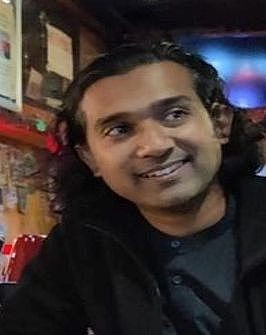
Time & Date
08.12.2022
5-7 ct
Room 47.0.501 (Teaching block WWP)
Universität West
Albert-Einstein-Allee 47
89081 Ulm
Local Host:
Prof. Dr. Heiko Neumann
Links
Neural Systems Laboratory
Dr. Yohan John - Tractatus Analogico-Mythologicus
Abstract: The talk will provide an overview of dynamical systems theory (DST), which enables a powerful geometric perspective on brain dynamics. I will argue that DST can serve as a framework to discuss not just neural phenomena, but also higher-level cognition and behavior. To this end, I will present some modeling work on cortico-thalamic circuits, demonstrating how some symptoms of psychiatric disorders can be viewed as "attractor pathologies" in these circuits.
Bio: Yohan studied Physics and received his BSc at St Stephen’s College in Delhi (India) in 2004 and his MSc at the Indian Institute of Technology (IIT) Bombay (India) in 2006. He then entered the Dept. of Cognitive and Neural Systems at Boston University (Boston, USA) headed by Prof. Steve Grossberg, where he graduated with a PhD in 2011. In his doctoral thesis (supervisors: Profs. Dan Bullock and Frank Guenther) he investigated the neural basis of how humans and animals generate the appropriately timed behavior. For this he developed a computational model of reinforcement learning-driven flexible timing in the basal ganglia. As a postdoctoral associate at the Neural Systems Laboratory (Sargent College, Boston University, Boston, USA; headed by Prof. Helen Barbas) from 2011 to 2016, he used computational modeling to explore cognitive-emotional interactions. He aims to uncover the dynamic properties of brain networks, and how disruption in these networks lead to symptoms of psychiatric disorders. Yohan currently holds the position of a Research Assistant Professor in the Neural Systems Laboratory at Sargent College. He is also interested in teaching and outreach. Most notably, he wites about neuroscience for the general public and has been a top writer on neuroscience on the question-and-answer site Quora. More recently, he organized the 'NeuroLogos' channel on YouTube where he and colleagues discuss recent developments in cognitive neuroscience topics.

Time & Date
08.12.2022
5-7 ct
Room 47.0.501 (Teaching block WWP)
Universität West
Albert-Einstein-Allee 47
89081 Ulm
Local Host:
Prof. Dr. Heiko Neumann
Links
Neural Systems Laboratory
Dr. Yohan John - Tractatus Analogico-Mythologicus